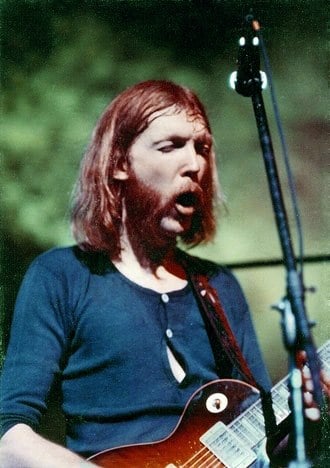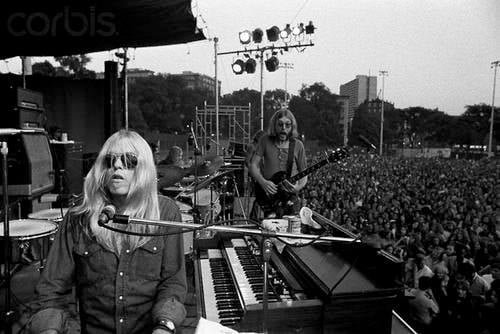October 29, 1971 – Duane Allman was killed when he lost control of his motorcycle
OCTOBER 29, 1971 – Allman Brothers guitarist DUANE ALLMAN (b. November 20, 1946 in Nashville, Tennessee) was killed when he lost control of his motorcycle on a Macon, Georgia street while trying to swerve to avoid a tractor-trailer. He was three weeks shy of his 25th birthday.
The tragedy occurred during a band break from touring and recording, while Allman was riding his motorcycle at a high speed on Hillcrest Avenue and approached Bartlett Street. A flatbed truck carrying a lumber crane stopped suddenly in the intersection, forcing Allman to swerve his Harley-Davidson Sportster motorcycle sharply to the left to avoid a collision. As he was doing so, he struck either the back of the truck or the ball on the lumber crane and was immediately thrown from the motorcycle. The motorcycle bounced into the air, landed on Allman and skidded another 90 feet with Allman pinned underneath, crushing his internal organs. Though he was alive when he arrived at the hospital, despite immediate emergency surgery, he died several hours later from massive internal injuries.
He was the eldest son of Willis Allman, a career United States Army sergeant, and Geraldine (née Robbins). His younger brother Gregg Allman was born in late 1947. While the family were living near Norfolk, Virginia, his father was murdered by a fellow veteran hitchhiker. In order to retrain as an accountant, Geraldine “Mama A” Allman sent Duane and Gregg to Castle Heights Military Academy in Lebanon, Tennessee, which they both disliked intensely In 1957, the family moved to Daytona Beach, Florida where the boys attended Seabreeze High School.

The boys returned to Nashville to spend summers with their grandmother where Gregg learned guitar basics from a neighbor. In 1960, Gregg had saved enough money to buy his first guitar, a Japanese-made Teisco Silvertone while Duane acquired a Harley 165 motorbike. Duane began to take an interest in the guitar, leading to fights over it, and eventually their mother bought Duane a Gibson Les Paul Junior.
It was also in Nashville that the boys became musically inspired by a rhythm and blues concert they attended, at which blues guitar legend B. B. King performed. Apparently, Duane turned to Gregg and said, “We got to get into this.”
Duane learned to play very quickly and soon became the better guitarist of the two, dropping out of high school to stay home during the day and focus on developing his guitar skills.
The two Allman brothers started playing publicly in 1961, joining or forming a number of small, local groups. Shortly thereafter, Duane quit high school to stay home during the day and focus on his guitar playing. Their band the Escorts opened for The Beach Boys in 1965 but disbanded and eventually became the Allman Joys. After Gregg graduated from Seabreeze High School in 1965, the Allman Joys went on the road, performing throughout the Southeast and eventually being based in Nashville and St. Louis, Missouri.
The Allman Joys morphed into another not-completely-successful band, The Hour Glass, which moved to Los Angeles in early 1967. There the Hour Glass produced two albums that left the band unsatisfied. Liberty, their record company, tried to market them as a pop band, completely ignoring the band’s desire to play more blues-oriented material.
In 1968, Gregg Allman went to visit Duane on his 22nd birthday. Duane was laid up in bed, nursing an injured left elbow suffered from a fall from a horse. Gregg brought along a bottle of Coricidin pills for his fever and the debut album by guitarist Taj Mahal as a gift. He left it on the front porch and rang the bell, as Duane was angry with him for the injury. “About two hours after I left, my phone rang,” Gregg states. “Baby brother, baby brother, get over here now!” When Gregg got there, he found that Duane had poured the pills out of the bottle, washed off the label and was using it as a slide to play “Statesboro Blues,” an old Blind Willie McTell song that Taj Mahal covered. “Duane had never played slide before,” said Gregg, “he just picked it up and started burnin’. He was a natural.” The song would go on to become a part of the Allman Brothers Band’s repertoire, and Duane’s slide guitar became crucial to their sound.

The Hour Glass broke up in early 1968, and Duane and Gregg Allman went back to Florida, where they played on demo sessions with February 31, a folk rock outfit whose drummer was Butch Trucks. Gregg returned to California to fulfill Hour Glass obligations, while Duane jammed around Florida for months but didn’t get another band going.
Allman’s playing on the two Hour Glass albums and an Hour Glass session in early 1968 at FAME Studios in Muscle Shoals, Alabama had caught the ear of Rick Hall, owner of FAME. In November 1968 Hall hired Allman to play on an album with Wilson Pickett. Allman’s work on that album, “Hey Jude” (1968), got him hired as a full-time session musician at Muscle Shoals and brought him to the attention of a number of other musicians, such as Eric Clapton, who later said, “I remember hearing Wilson Pickett’s ‘Hey Jude’ and just being astounded by the lead break at the end. I had to know who that was immediately—right now.”
Allman’s performance on “Hey Jude” blew away Atlantic Records producer and executive Jerry Wexler when Hall played it over the phone for him. Wexler immediately bought Allman’s recording contract from Hall and wanted to use him on sessions with all sorts of Atlantic R&B artists. While at Muscle Shoals, Allman was featured on releases by a number of artists, including Doris Duke, Clarence Carter, King Curtis, Aretha Franklin, Laura Nyro, Wilson Pickett, Otis Rush, Percy Sledge, Johnny Jenkins, Boz Scaggs, Delaney & Bonnie and jazz flautist Herbie Mann.
The limits of full-time session playing frustrated Allman. The few months in Muscle Shoals were by no means a waste, however; besides meeting the great artists and other industry professionals with whom he was working, Allman had rented a small, secluded cabin on a lake and spent many solitary hours there refining his playing. Perhaps most significantly, Allman got together with R&B and jazz drummer Jaimoe Johanson, who came to meet Allman at the urging of Otis Redding’s manager, Phil Walden, who by now was managing Allman and wanted to build a three-piece band around him. Allman and Jaimoe got Chicago-born bassist Berry Oakley to come up from Florida and jam as a trio, but Berry was committed to his rock band with guitarist Dickey Betts, the Second Coming, and returned south.

Getting fed up with Muscle Shoals, in March Allman took Jaimoe with him back to Jacksonville, Florida, where they moved in with Butch Trucks. Soon a jam session of these three plus Betts, Oakley, and Reese Wynans took place and forged what all present recognized as a natural, or even magical, bond. With the addition of brother Gregg, called back from Los Angeles to sing and replace Wynans on keyboards, at the end of March 1969, the Allman Brothers Band was formed. (Wynans became well known over a decade later as organist with Stevie Ray Vaughan & Double Trouble.) After a bit of rehearsing and gigging, the sextet moved to Macon, Georgia, in April to be near Walden and his Capricorn Sound Studios. While living in Macon, Allman met Donna Roosman, who bore his only child, Galadrielle. Despite their child, the relationship quickly ended.
The Allman Brothers Band went on to become one of the most influential rock groups of the 1970s, described by Rolling Stone’s George Kimball in 1971 as “the best damn rock and roll band this country has produced in the past five years.” After months of nonstop rehearsing and gigging, including free shows in Macon’s Central City Park and Atlanta’s Piedmont Park, the group was ready to settle on the Allman Brothers Band name, and to record. Their debut album, “The Allman Brothers Band”, was recorded in New York in September 1969 and released a few months later. In the midst of intense touring, work began in Macon and Miami (Atlantic South – Criteria Studios), and a little bit in New York, on the band’s second album “Idlewild South.” Produced mostly by Tom Dowd, Idlewild South was released in August 1970 and broke new ground for them by quickly hitting the Billboard charts.
A group date in Miami, also that August, gave Allman the chance to participate in Eric Clapton’s “Layla and Other Assorted Love Songs”. Clapton had long wanted to meet Allman; when he heard that the Allman Brothers were due to play in Miami, where he had just started work on Layla with producer Tom Dowd, he insisted on going to see their concert, where he met Allman. At one point, Allman approached Clapton, fully admiring his ability to play guitar as much as Clapton admired his, and cautiously asked Clapton if he could come by the studio to watch. Clapton eagerly agreed, since he knew that his masterful playing combined with Allman’s would be greater than the sum of its parts. After the show the two bands (the Allman Brothers Band and Derek and the Dominos) returned to Criteria, where Allman and Clapton quickly formed a deep rapport during an all-night jam session. Allman wound up participating on most of the album’s tracks, contributing some of his best-known work. Allman never left the Allman Brothers Band, though, despite being offered a permanent position with Clapton. Allman never toured with Derek and the Dominos, but he did make three appearances with them on December 1, 1970 at the Curtis Hixon Hall in Tampa (“Soulmates” LP) and the following day at Onondaga County War Memorial in Syracuse, NY, and one appearance (or possibly just Delaney Bramlett or both Allman and Delaney) November 20, 1970 at the Santa Monica Civic Auditorium, California.
In an interview, Allman told listeners how to tell who played what: “Eric played the Fender parts and Duane played the Gibson parts. He continued by nonchalantly noting that the Fender had a sparklier sound, while the Gibson produced more of a “full-tilt screech”. Clapton wrote later in his autobiography that he and Allman were inseparable during the sessions in Florida, and talked about Allman as the “musical brother I’d never had but wished I did.”
The Allman Brothers went on to record At Fillmore East in March 1971. Meanwhile, Allman continued contributing session work to other artists’ albums whenever he could. According to “Skydog: the Duane Allman Story,” Allman was in the habit of spontaneously dropping in at recording sessions and contributing to whatever was being taped that day. He received cash payments but no recording credits, making it virtually impossible to compile a complete discography of his works.
Allman was well known for his melodic, extended and attention-holding guitar solos. During this period two of his stated influences were Miles Davis and John Coltrane, having listened extensively to “Kind of Blue” for two years.
SOURCES
http://www.duaneallman.info/
http://www.biography.com/people/duane-allman-251025
http://www.allmusic.com/…/duane-allman…/biography
http://www.guitarworld.com/deep-tribute-musical-genius…
http://www.legacy.com/…/duane-allmans-guitar…/2796/
http://www.rollingstone.com/…/100…/duane-allman-20101202
https://rockhall.com/inductees/the-allman-brothers-band/bio/
https://www.facebook.com/allmanbrothersband
https://www.facebook.com/DuaneAllmanOfficial
http://en.wikipedia.org/wiki/The_Allman_Brothers_Band
http://en.wikipedia.org/wiki/Duane_Allman
